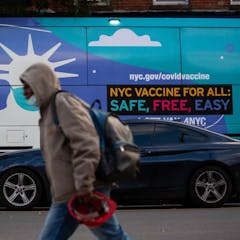
Articles on Health inequity
Displaying 21 - 40 of 51 articles

Appalachia has one of the highest rates of oral health problems per person in the US.

Overcoming the access barriers and biases that underrepresented and underserved communities face could not only improve research participation but also improve care.

The omission of growing evidence that Māori, and Māori women in particular, have worse health outcomes after HIV infection could derail New Zealand’s elimination plans and exacerbate disparities.

During spring and summer, as more people consider exercising outdoors, a trauma- and violence-informed approach to physical activity can help ensure equity, inclusion, safety and access.

For people who struggle to meet their basic needs, it will take a lot more than simple psychological exercises to flourish. It will take systemic change.

People living in poverty or disadvantage are three times more likely to die from COVID than the wealthy.

On the surface, sober months like Dry January and Dry February are great. But we need to broaden the discussion around how privilege and policy impact one’s relationship with alcohol and other drugs.

Governance structures that provide opportunities for people to contribute to decision-making would also enhance people’s abilities to control important factors in their life.

Addressing racial and ethnic health gaps is becoming even more important as the US population continues its shift toward a minority-majority nation.

Vaccines and medical treatments can only go so far in an unequal society. Facing the ongoing history of racial discrimination and bias in the US would help end the pandemic.

Black American women have disproportionate HIV infection rates – in part because of systemic and structural racism in the health care system.

Canada’s largely private dental care system exacerbates inequalities and is a barrier to integrating oral health with general health.

Lockdowns can exacerbate existing mental illness, but people without a history of mental illness can also find themselves feeling low, unmotivated and lacking a sense of purpose.

After the CDC changed course in late July, recommending universal masking indoors, Nevada became the first state to adopt a flexible masking policy that can quickly adjust to changing COVID-19 rates.

Socio-economic factors are major barriers to physical activity. New research suggests this is one more reason why disadvantaged people were at increased risk for COVID-19.

People who haven’t gotten vaccinated for COVID-19 often have complex reasons for their relunctance or may face other barriers. Lumping them all together undercuts the vaccination campaign.

Patients shouldn’t be treated better simply because they can afford to pay more.

Medical innovations paired with innovative programs to get them to Black, Indigenous and Hispanic Americans can help close the health inequality gap.

Age and education level are the main factors associated with vaccine hesitancy. While this affects Māori and Pacific communities, basic access to health care and information is more important.

Electric cars are being touted as the best way to reduce emissions from transport. But a climate policy that relies on individuals paying for new technology runs the risk of aggravating inequities.





